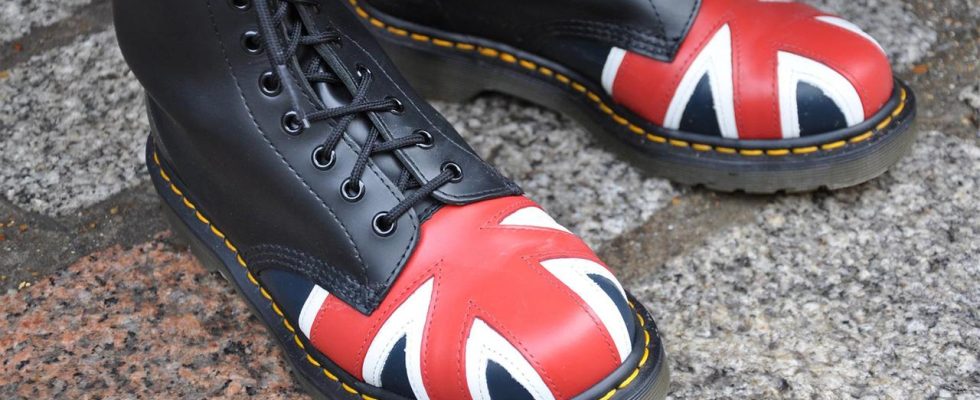Weak demand from customers, but also Chinese low-cost suppliers such as Temu and Shein, are making the London shoe brand Dr. Martens difficult to do. The stock collapses by 30 percent.
New boots from Dr. Martens are stiff, pressurizing and can cause painful blisters. But once the hard leather has broken in, they become comfortable. A layer of wax on the leather also makes the chunky boots with yellow seams waterproof. However, the bad news that rains down on the British company itself no longer rolls off so easily.
On the contrary: today the shares of the cult shoe manufacturer on the London Stock Exchange collapsed by 30 percent, marking a record low. In order to mitigate the turbulence, trading in the securities even had to be temporarily suspended.
Gloomy outlook for next year
What exactly had investors so shocked? Dr. Martens had published an unscheduled trading update – including a gloomy outlook for 2025. The coming financial year will be challenging, the British group warned, pointing to weak demand in the USA, the company’s largest market. Customers there are currently reducing their full inventory.
Group-wide, revenues are therefore likely to decline in single-digit percentage terms in 2025. When it comes to profit before taxes, Dr. Martens even fell to a third of the 2024 value. But that’s not all: the announced resignation of the CEO is also causing great uncertainty. Kenny Wilson is to be replaced by the current brand boss Ije Nwokorie. Meanwhile, an action plan aims to help revive demand for boots in the US.

Dr. Klaus Märtens and Dr. Martens
The Dr. Martens owe their name to their inventor, Dr. Klaus Märtens. After the Second World War, the German doctor developed a robust work shoe with a flexible sole. In 1947, together with his business partner Herbert Funk, he began making the soles from rubber from the disused German Air Force. In 1952 they opened the first factory in Munich. In 1959, the British shoe manufacturer R. Griggs bought the patent from the Germans, and from then on the shoes were called Dr. Martens.
They were initially worn by factory workers and police officers, later by mods, skinheads and punks – and even later by representatives of the grunge and indie pop genres. The noughties brought probably the biggest innovation for the British company: In April 2003, Dr. Martens AirWair opened its factories in England, and since then all of the company’s shoes have been produced in Vietnam, China and Thailand.
Lawsuit against Temu in Great Britain
But the problems of Dr. Martens are not only in the USA, but also in China. Just yesterday, the British shoe manufacturer filed a lawsuit against the Chinese low-cost marketplace Temu in the UK Supreme Court, according to the “Times” reports. The accusation: trademark violations.
Temu is said to have advertised its own boots on Google using terms such as “Dr. Martens” and “Airwair” – which is a well-known model from the brand. This is said to have led to ads and products from the Chinese cheap retailer suddenly landing at the top of Google and the real Dr. Martens pushed out.
Temu is not the only Chinese marketplace with which Dr. Martens is in trouble. The British accuse the Shein company, which specializes in ultra-cheap fast fashion products, of copying its own designs.
Competition from online giants from China
Incredibly low prices and marketing on social media tailored to the young target group have quickly turned the Chinese platforms into online giants. Today they are a billion-dollar power.
According to Statista, Shein, for example, was able to double its sales to $30 billion between 2021 and 2022 alone. Temu increased its revenues by almost 39 percent in the same period. In Germany, one in four people has already shopped at Temu. Shein is one of the highest-selling fashion online shops in this country.
Entire fashion industry under strong pressure
The fashion industry is under massive pressure because of cheap competition from China. Even H&M and Primark, the parent companies of “fast fashion”, are feeling this. Shein is contesting their online business. Last year, H&M filed a lawsuit in Hong Kong against Shein and several associated companies. The Swedish textile company is demanding compensation. An interim injunction should also prohibit the Chinese from further violating trademark rights.
As much as Shein and Temu are causing problems for established fashion brands and manufacturers: Looking at Dr. For Martens, it may be far too early for a swansong. After all, there is hardly another shoe – apart from Converse Chucks – that has experienced as many revivals as the boot from Dr. Martens.

